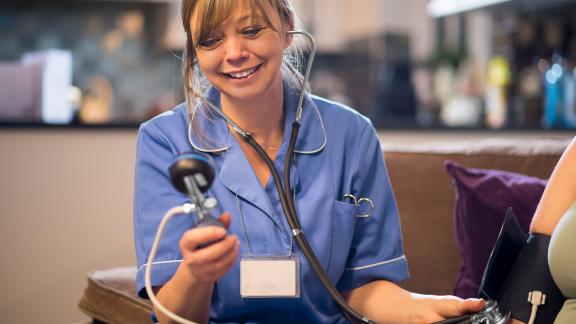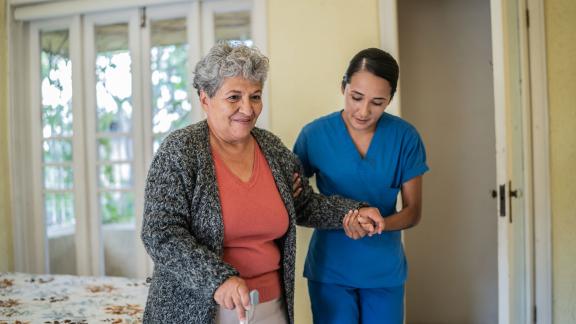Experiential learning skills supports T Level placements in maternity and neonatal care

Overview
East Sussex Healthcare NHS Trust provides structured six-week block placements for second-year T Level students in Eastbourne Maternity Unit. Clear guidance on observational, supervised, and participatory skills ensures students contribute meaningfully while gaining valuable experience across maternity services
Key benefits and outcomes
- Students contribute to both direct and indirect clinical care.
- Clear guidance ensures safe and effective integration into clinical teams.
- Placements inspire students to pursue careers in maternity and neonatal care.
- Staff benefit from additional support, improving service efficiency.
What the organisation faced
East Sussex Healthcare NHS Trust wanted to support future healthcare professionals by offering meaningful placements in maternity care. They recognised the need for clear boundaries and expectations to ensure placements were safe, educational, and beneficial for both students and staff.
What the organisation did
The trust partnered with Bexhill 6th Form College and East Sussex College Hastings to offer six-week block placements for second-year T Level students.
Under the mentorship of maternity support workers, students rotated antenatal and postnatal departments, delivery suite theatres, newborn clinics and specialist teams such as hearing screening, bereavement and nursery nurses.
To prepare students, the trust developed a comprehensive induction process. Students received a welcome booklet outlining:
- the trust’s structure and maternity care roles
- the inclusive language and abbreviations used in the unit
- the importance of informed consent before observation or participation.
It includes a skills guide, clarifying what students can observe, what skills they can practice under supervision and what they are not allowed to assist with. It also gives them a firm foundation, helping them learn new skills quickly. The clarity helped managed expectations and ensured students and staff understood boundaries and responsibilities.
Students applied their college learning in health and safety, safeguarding, infection control, and clinical skills. Their contributions included:
Indirect clinical care: booking appointments, requesting blood tests and accessing data on the trust’s maternity and neonatal digital system
Direct care: assisting with routine maternal observations, preparing mothers for ultrasound scans and supporting baby feeding.
In specialised clinics, students helped set up the clinical areas and obtained urine samples, performing dip tests, administering the glucose drink and managing the timing between drinks.
Before they start their industry placement, T Level students have already gained essential knowledge in college in health and safety, person-centred care, well-being, safeguarding and infection control. They have a basic understanding of human anatomy and clinical skills, like recording physiological observations and obtaining urine samples so they are well-prepared for their placements. The students can quickly apply their simulation-learned skills to practice and they are quick to acquire new skills, such as applying TED stockings and TENS machines, and promoting and assisting with baby and parent skin-to-skin contact.
Being exposed to different roles and responsibilities in maternity care has inspired T Level students to study midwifery and paediatric nursing or become maternity support workers after completing their T Level programme.
“Having a T Level student observe and assist a midwifery support worker in the community has helped contribute to the day running smoothly. While the midwifery support worker labels blood and bottles or documents patient notes, the student is preparing the clinic room by cleaning surfaces and preparing urine bottles for the next patient. Students being able to perform these tasks gives the midwifery support worker more time to spend with the patient if needed or enables them to get the next patient into their appointment quicker, minimising delays”.
Pauline Parks, Maternity Associate Practice Educator/T Level Student Mentor
Results and benefits
- During the placements students rotate through different maternity services which teaches them to adapt quickly which means they then transitioned smoothly from college to clinical environments.
- Staff gained extra support, improving workflow and patient experience.
- Students developed confidence and clinical competence.
- Placements inspired students to pursue careers in midwifery, paediatric nursing, or maternity support work.
Takeaway tips
- Provide clear written guidance on what students can observe, practice, and not assist with
- Rotate students through different services to build adaptability and broaden experience
- Encourage students to apply college learning to real-world tasks
- Use simulation-based training to prepare students for clinical environments
- Ensure staff and students understand boundaries to create a safe and supportive placement.
Contact details
For more information about this case study, contact: Pauline Parks, Maternity Associate Practice Educator / T Level Student Mentor.



